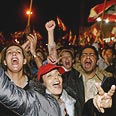
Masses hit streets in Beirut
Photo: Reuters
The dramatic events in Lebanon are sure to resonate throughout the Middle East and accelerate democratization processes, says noted Syria expert Itamar Rabinovich.
"The three spots where we see democratization processes in the Arab world are all under occupation – Iraq, the territories, and Lebanon," he says. "Yet those situations give rise to expressions of authentic popular activity."
Government Quits
By Roee Nachmias and Ali Waked
Opposition leader declares victory after Lebanese Prime Minister announces government's resignation; demonstrators urged to continue protests until Syrian forces pull out of country
Democratization urges exist elsewhere
As a result, there are no fears among Arabs that events there stem from American pressure, as is the case in Iraq for example, he says.
"In any event, the pressures for democratization exist in other places and I have no doubt they would erupt, in one way or another, in the future," Rabinovich says. "There is almost no Arab state where such pressures don't exist."
However, the Syrians are unlikely to renounce their dominance in Lebanon without a fight, he says.
"The Syrian regime has taken pride in its longstanding dominance of Lebanon…the country constitutes strategic asset for the Syrians," Rabinovitch says.
Among other benefits, the Syrian presence allows Damascus to prepare for a possible Israeli attack via Lebanon, he says, but adds that President Bashar Assad's unskilled regime is indeed facing a crisis.
Pressure on Syria to intensify
Moreover, Monday's events in Lebanon are significant on three levels, Rabinovich says.
The political crisis will intensify the crisis atmosphere in Lebanon, pressure on Syria to pull out of Lebanon will intensify, and a precedent of a non-violent popular protest bringing down a puppet regime has been set, he says.
"The opposition would draw encouragement from the current achievement and boost the pressure, but it appears the Syrians on their part would boost efforts to alleviate the crisis," Rabinovitch says.
For Syria, this is no longer a war for Lebanon, but a struggle to protect their home turf, he adds, because the Lebanese example could stimulate internal Syrian opposition forces, which have been dormant for a long time.















